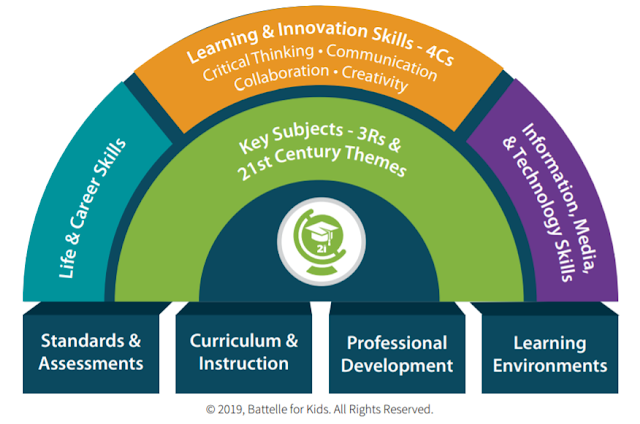21st Century Learning
Nowadays everything is changing so fast and humanity have important rivals such as Robots and AI (artificial intelligence) in the economic field. Thus, we must change the ways we train and learn, and therefore our education systems.
There's a good framework for 21st-century learning that was developed with input from educators, education experts, and business leaders. I think especially educators and educational institutions should examine it. In this blog post, I will share that framework with you.
There's a good framework for 21st-century learning that was developed with input from educators, education experts, and business leaders. I think especially educators and educational institutions should examine it. In this blog post, I will share that framework with you.
Key Subjects
"Mastery of key subjects and 21st-century themes is essential for all students in the 21st century." Key subjects include:- English, reading, or language arts
- World languages
- Arts
- Mathematics
- Economics
- Science
- Geography
- History
- Government and Civics
21st Century Themes
"In addition to these subjects, we believe schools must move to include not only a focus on mastery of key subjects but also promote understanding of academic content at much higher levels by weaving 21st-century interdisciplinary themes into key subjects":- Global Awareness
- Financial, Economic, Business and Entrepreneurial Literacy
- Civic Literacy
- Health Literacy
- Environmental Literacy
Life and Career Skills
- Flexibility and Adaptability
- Initiative and Self-Direction
- Social and Cross-Cultural Skills
- Productivity
- Accountability
- Leadership and Responsibility
Learning and Innovation Skills
"Learning and innovation skills are what separate students who are prepared for increasingly complex life and work environments in today’s world and those who are not. "- Creativity and Innovation
- Critical Thinking
- Problem Solving
- Communication
- Collaboration
Information, Media, and Technology Skills
"People in the 21st century live in a technology and media-driven environment, marked by various characteristics, including 1) access to an abundance of information, 2) rapid changes in technology tools, and 3) the ability to collaborate and make individual contributions on an unprecedented scale. Effective citizens and workers of the 21st century must be able to exhibit a range of functional and critical thinking skills related to information, media, and technology."- Information Literacy
- Media Literacy
- ICT (Information, Communications and Technology Literacy)
21ST CENTURY SUPPORT SYSTEMS
"21st-century learning requires an innovative support system to engage learners through applicable skills and knowledge, appropriate technologies, and real-world connections to make learning relevant, personalized, and engaging. P21 has identified five critical support systems to ensure all students receive the kinds of learning experiences that build 21st-century competency":- Standards
- Focus on 21st-century skills, content knowledge, and expertise
- Build understanding across and among key subjects as well as 21st-century interdisciplinary themes
- Emphasize deep understanding rather than shallow knowledge
- Engage students with the real-world data, tools, and experts they will encounter in college, on the job, and in life; students learn best when actively engaged in solving meaningful problems
- Allow for multiple measures of mastery
- Assessment
- Support a balance of assessments, including high-quality standardized testing along with effective formative and summative classroom assessments
- Emphasize useful feedback on student performance that is embedded into everyday learning
- Require a balance of technology-enhanced, formative, and summative assessments that measure student mastery of 21st-century skills
- Enable the development of portfolios of student work that demonstrate mastery of 21st-century skills to educators and prospective employers
- Enable a balanced portfolio of measures to assess the educational system’s effectiveness in reaching high levels of student competency in 21st-century skills
- Curriculum and Instruction
- Teach 21st-century skills discretely in the context of key subjects and 21st-century interdisciplinary themes
- Focus on providing opportunities for applying 21st-century skills across content areas and for a competency-based approach to learning
- Enable innovative learning methods that integrate the use of supportive technologies, inquiry- and problem-based approaches and higher-order thinking skills
- Encourage the integration of community resources beyond school walls
- Professional Development
- Highlight ways teachers can seize opportunities for integrating 21st-century skills, tools, and teaching strategies into their classroom practice — and help them identify what activities they can replace/de-emphasize
- Balance direct instruction with project-oriented teaching methods
- Illustrate how a deeper understanding of subject matter can enhance problem-solving, critical thinking, and other 21st century skills
- Enable 21st-century professional learning communities for teachers that model the kinds of classroom learning that best promotes 21st-century skills for students • Cultivate teachers’ ability to identify students’ particular learning styles, intelligences, strengths, and weaknesses
- Learning Environments
- Create learning practices, human support, and physical environments that will support the teaching and learning of 21st-century skill outcomes
- Support professional learning communities that enable educators to collaborate, share best practices, and integrate 21st-century skills into classroom practice
- Enable students to learn in relevant, real-world 21st-century contexts (e.g., through project-based or other applied work)
- Allow equitable access to quality learning tools, technologies, and resources
- Provide 21st century architectural and interior designs for a group, team, and individual learning
- Support expanded community and international involvement in learning, both face-to-face and online



Comments
Post a Comment